Last Updated on 29 August 2024 by Cycloscope

Cycling in Qinghai, China. Our bicycle tour through the Tibetan Plateau in China.
At first, the road is lined with trees and shaded, then the willows begin. There’s always a latent stench of garbage, though we can’t pinpoint its source. We take a path that leads us off the main road, crossing two villages surrounded by cultivated fields.
Here, every possible centimeter is utilized; no house has a garden, and the grain grows right up to the front door. There’s only a small concrete path leading from the door to the street. We stop to buy water and a can of bean soup in the village of Uubo, which has a beautiful temple and stupa.
Because crops are everywhere, finding a campsite is challenging. We find a small space between corn and rice behind an apparently uninhabited house. We’re at an altitude of 1,850 meters. We eat the bean soup and canned vegetables, which aren’t bad but have a slightly sweet taste.
We wake up at 6 a.m. when a man in a car with a microphone passes by, repeating a litany—our alarm clock for the day. The real alarm, however, comes shortly after: two old women stand in front of our tent. One of them starts cutting the grass with a sickle while the other watches us.
There’s also a man on a three-wheeled scooter who completely ignores us. The only problem is that with the woman standing there, we can’t relieve ourselves.
We dismantle the tent and set off to find a place for breakfast. It’s 7:40 a.m., the earliest we’ve ever started our day.
Before leaving, Daniele takes a sip of the water we bought yesterday, only to discover it isn’t water but some unidentified, disgusting, super-alcoholic beverage. We give it to the man who ignored us.
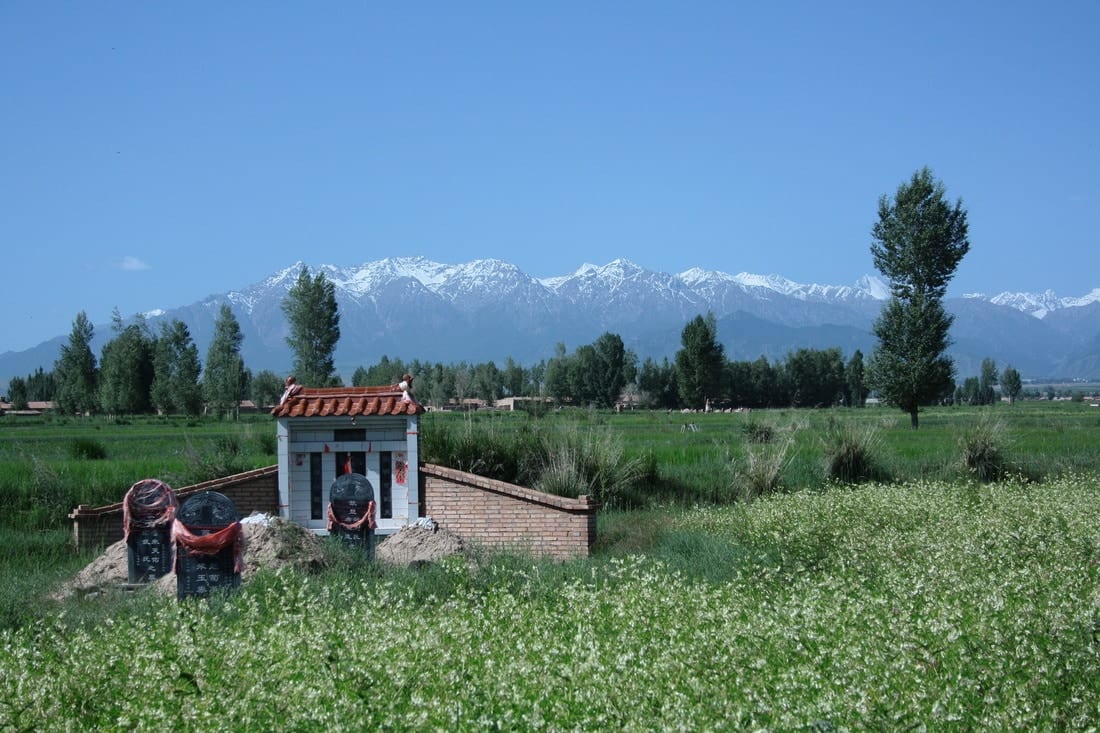
After breakfast, we hit the road again and encountered our first small altar and stupas in the middle of a wheat field—a romantic, bucolic Buddhist scene. We arrive at another village, Sanbao, which has no temples.
A policeman asks to take a photo with us, and soon, we find ourselves taking pictures with everyone present. We’re getting used to posing with locals in China. We ask where we can find a clothing store.
We’d like to buy something warm because we’ll be at altitudes between 3,000 and 4,000 meters over the next few days, and we’re not well-equipped.
The policeman, who speaks a little English, tells us we can find stores in the next town, Minle. OpenStreetMap doesn’t even list it; it must be a newly built city.
After about fifteen kilometers, we arrive. Just before the town, we find a jacket and a long-sleeved shirt, abandoned by someone, and we take them. Half the shopping is done.
There was also a pair of men’s red underwear, but we decided we could survive without it. Minle is another town that seems to have sprung up out of nowhere, with many new buildings and even more under construction.
Huge posters show how beautiful this city will be in the future and how convenient it is to buy an apartment here, but it’s likely that most of these buildings will remain deserted—a dark reminder of Chinese real estate speculation.
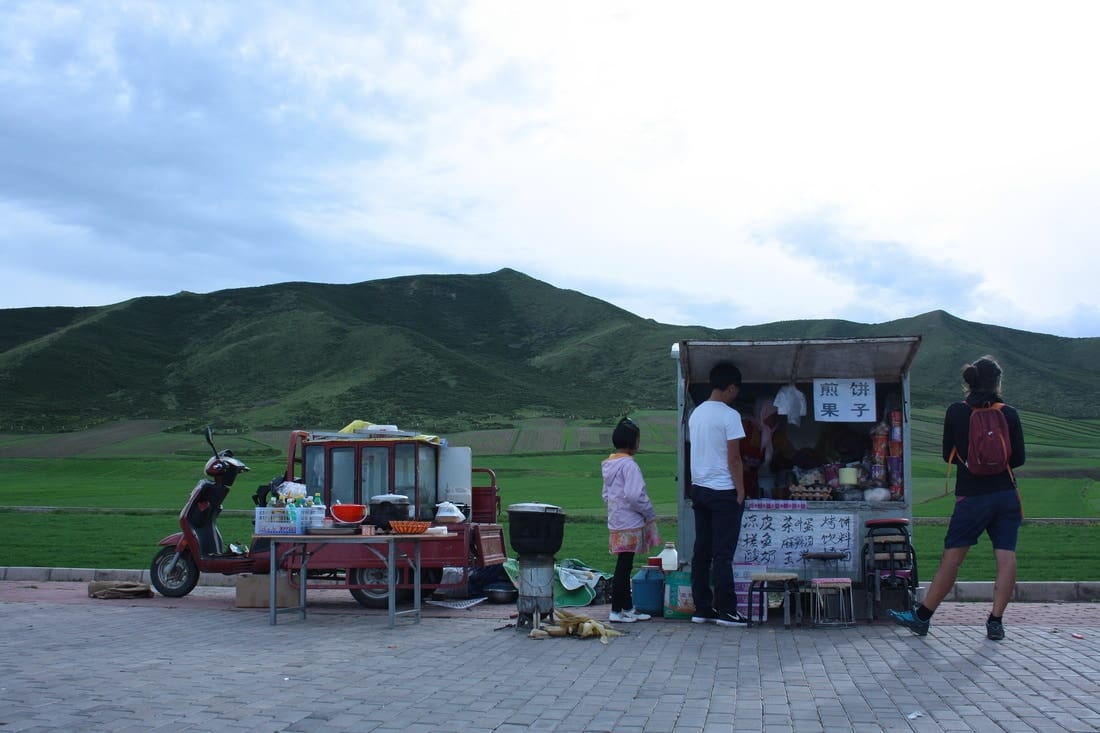
As we continue, despite being at an altitude of 2,000 meters, the fields don’t diminish. The landscape is enchanting; the fields extend up to where the terrain becomes too steep, then give way to towering rocky peaks with snow-capped tops. Deforestation is rampant, with very few trees remaining.
The fields end only when we reach an altitude of 2,800 meters, where they make way for pastures. There, we find a vantage point where a Tibetan woman has a booth offering a specialty we’ve never seen before.
She makes a batter similar to that of French crepes and cooks it on a plaster surface. Then, she adds an egg, spreads it out, applies hot sauce and another dark sauce, adds a lettuce leaf and two fried dumplings, and finally rolls the whole thing up.
It’s very good. We also buy some hard-boiled eggs—2 yuan for a boiled egg and 8 yuan for the Tibetan dish.
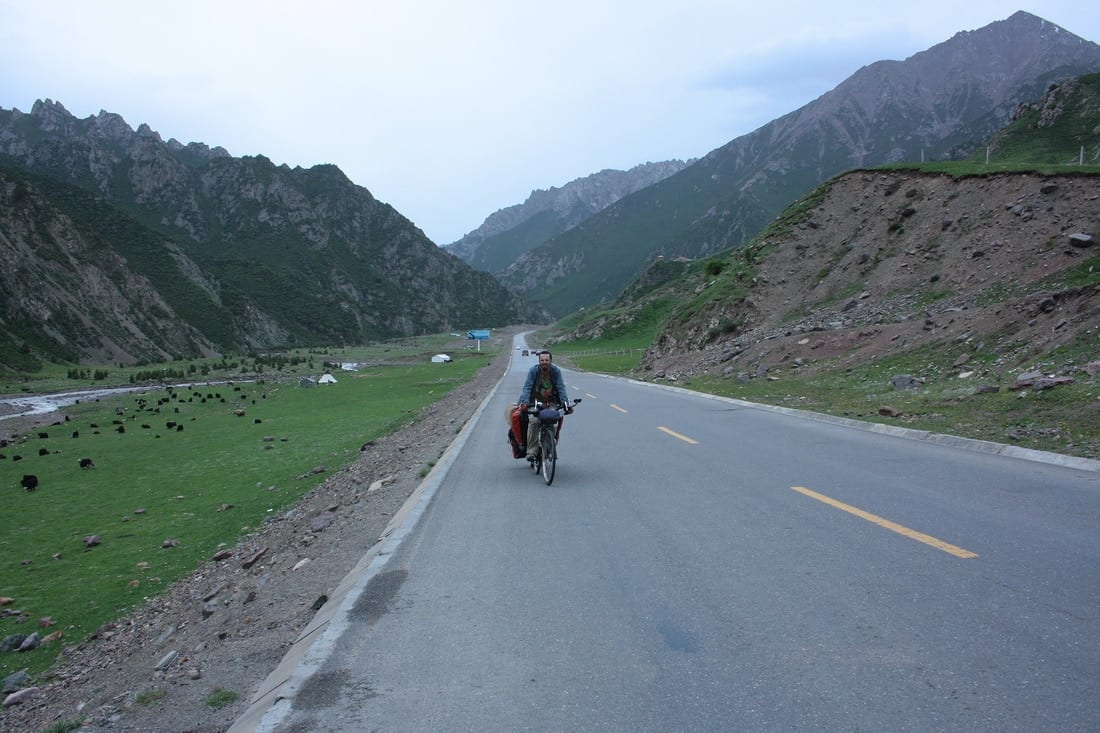
A few hundred meters further, we meet a river and stop to pitch our tent. It’s chilly. Across the river, we see the first tents of nomadic shepherds with their flocks of sheep. With our new jackets from rural China, we don’t feel too cold at night.
We wake up early, but it’s hard to get out of bed because without the sun warming the tent, we could sleep all day. But eventually, we get up and face the climb to 3,800 meters.
We meet a group of local cyclists coming from the opposite direction, downhill. They have brand new bicycles and two cars following them, probably to bring them back in the evening. The Chinese are always well-organized.
We talk a lot, but we don’t understand much, except that they want to take numerous pictures with us and compliment us for taking out our garbage (which they see hanging on the bike) instead of littering.
Meanwhile, they smoke and throw their cigarette butts on the ground.
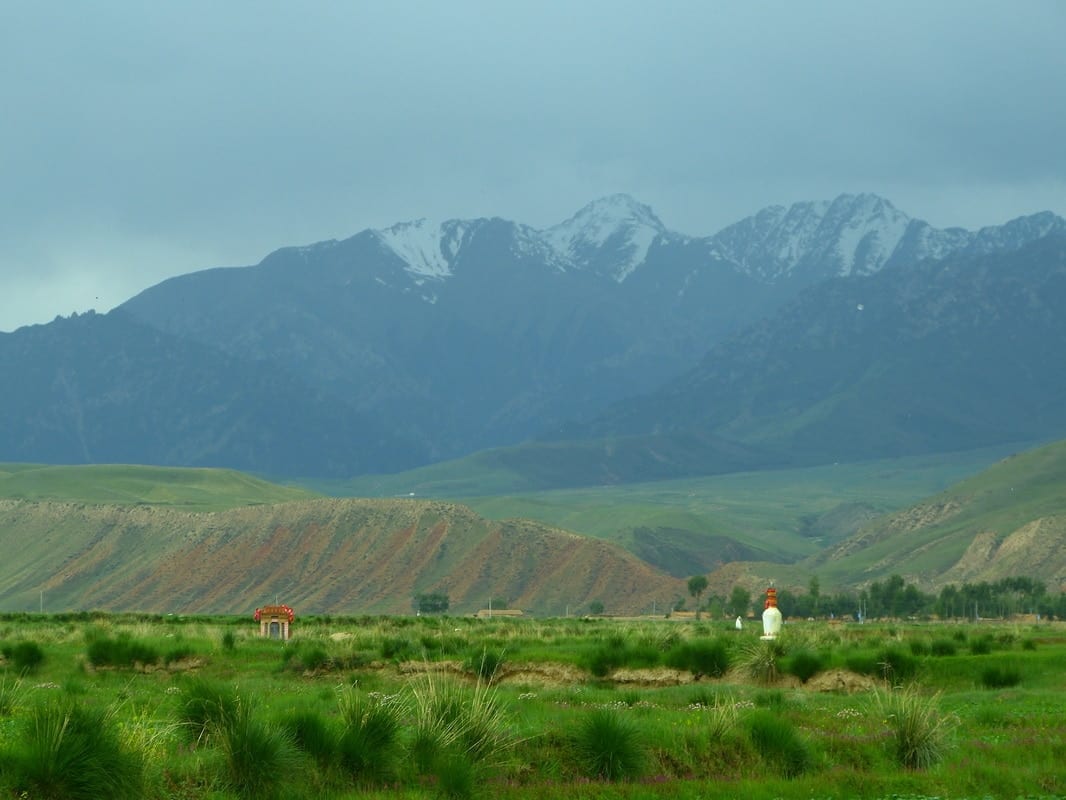
After bidding farewell to our cycling friends, the real climb begins. Despite the chill, we sweat and tire easily. After a few kilometers, we spot our first yak, just as expected—very hairy with large horns.
Of course, there are nomadic tents nearby. The inhabitants are mostly Tibetan, Mongolian, and Tu.
The tents they live in aren’t like yurts but are more like standard tents. Some large tents are used only as kitchens, powered by dried dung. These tents aren’t decorated like the Kyrgyz ones; there are no elaborate felt shirdaks.
Only a few are white with embroidered color patterns. They lack heating and are perhaps used for prayer or some other ritual or social purpose.
The landscape around us is stunning, with a river flowing beside us. The road steadily climbs, but the incline doesn’t change much—no sharp turns or steep sections.
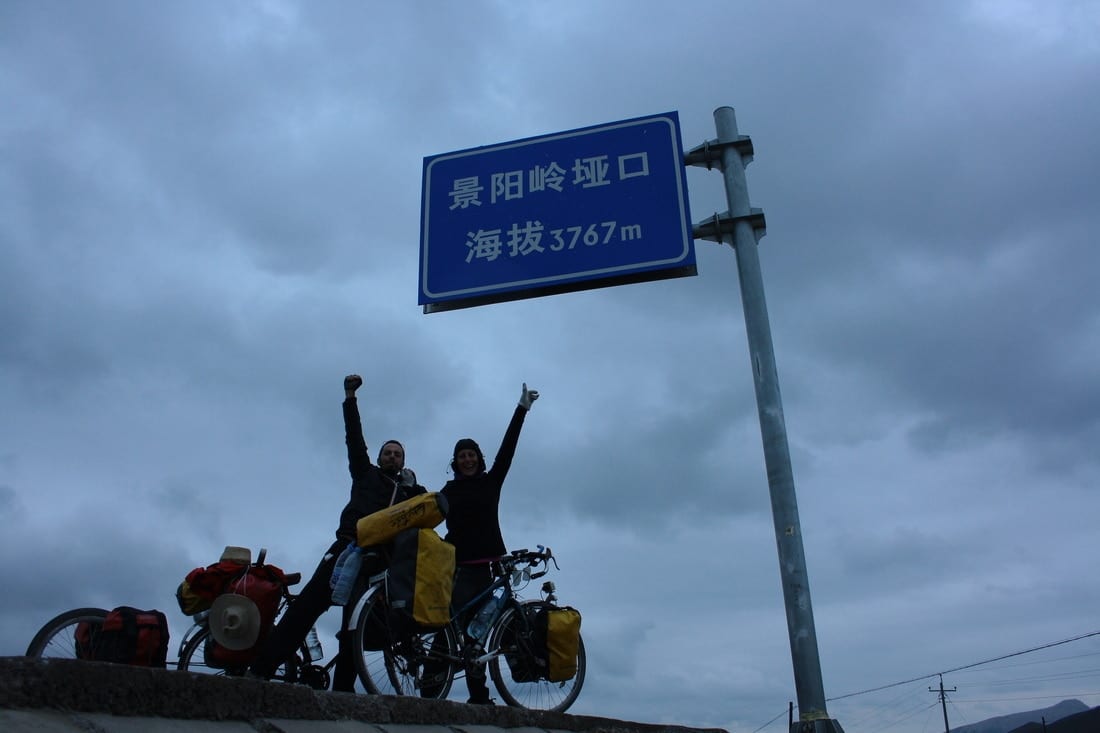
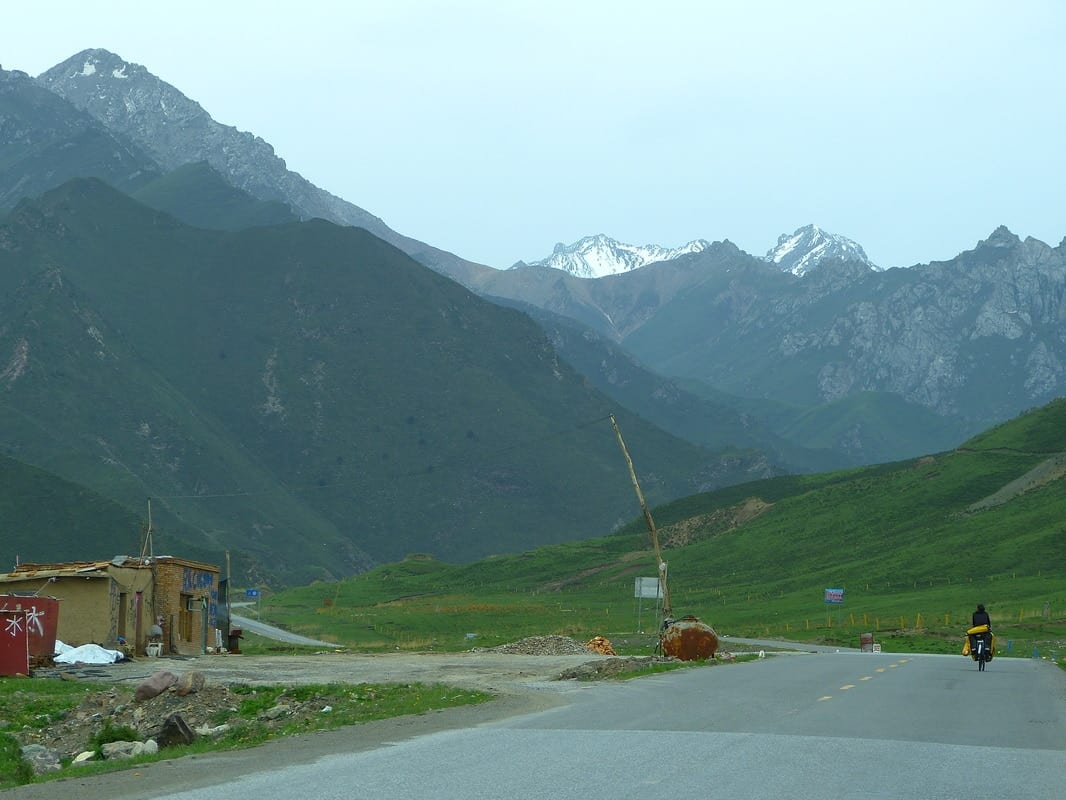
We come across a beautiful temple built into the rock, with the rock literally forming part of the temple structure. People driving by stop to make offerings or say a prayer. The prayers are represented by colorful scarves, known as Lung Ta, with inscriptions on them. These scarves are tied everywhere—on temples, trees, poles, and more.
Despite the Chinese government’s presence, Buddhism remains quite popular here. The last few kilometers before reaching the pass are a bit exhausting, and Elena starts to push her bike.
For the first time, a Chinese man—who is clearly Tibetan—stops his van and offers me (Elena) a lift to the pass, or at least that’s what I think he’s offering. We still have about six kilometers to go to reach the next village, Obo.
I tell him it’s fine to go as far as Obo, but we don’t fully understand each other, and he eventually drives off. China is the only country we’ve traveled through so far where people haven’t offered us anything—no vodka, no coffee, no tea.
Maybe they’re hesitant to interact with Westerners, at least in this part of China. We’re reflecting on this because we didn’t have breakfast—just a bit of biscuit and honey.
The climb from 2,800 to 3,700 meters is about 30 kilometers, taking us from Gansu into Qinghai. There are no places to eat along the way. We reach the top of the pass at 5 p.m., where we see many colorful Tibetan flags. It’s June 21st, and the temperature is 8 degrees Celsius. I find a pair of work gloves on the road, which come in handy for keeping my hands warm during the downhill ride.
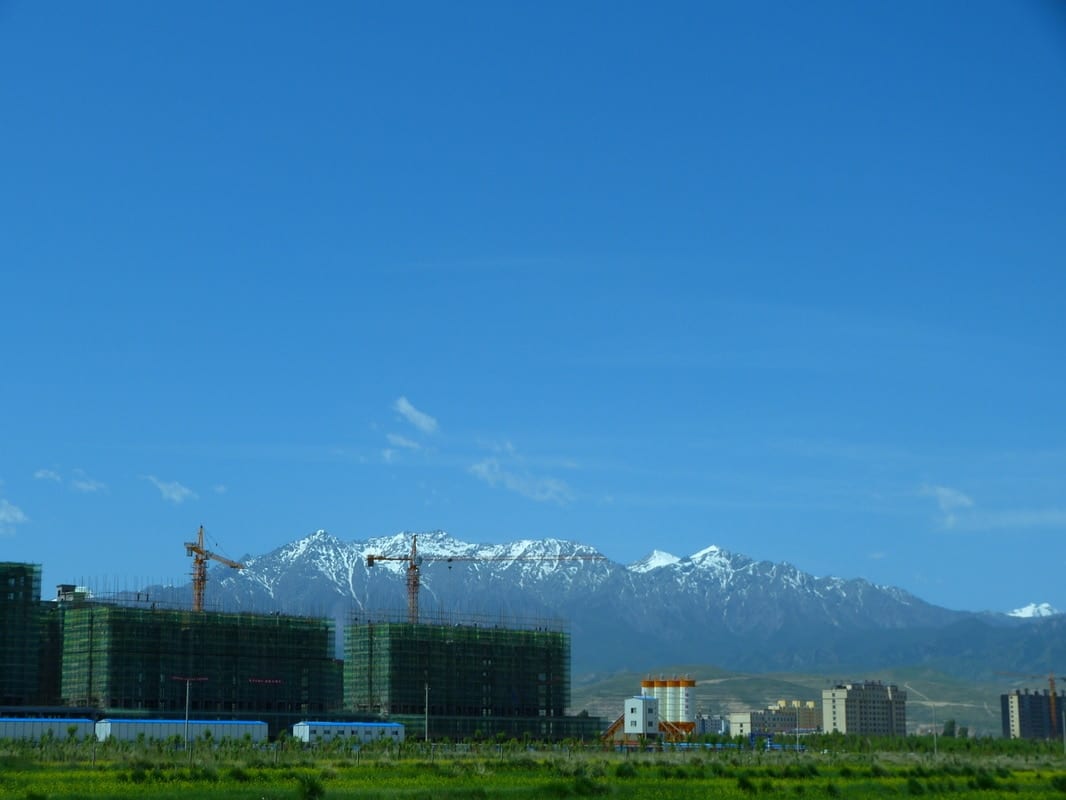
We enjoy a wonderful downhill ride and reach the village of Obo, located at 3,400 meters. Finally, we have a meal—noodles in broth, a cheap dish that usually costs 7 yuan (about 1 euro).
The restaurant is run by Muslims, and the cook prepares the handmade lamian noodles right in front of us. The broth is delicious, made with various vegetables, chives, and small pieces of meat.
As we leave the restaurant, we notice that the town has a significant Muslim population and even a mosque. The village is large, and like many places around here, they are constructing large apartment blocks, though it’s unclear who will live in them. In short, we’re still at 3,400 meters.
After another ten kilometers, the fenced pastures for yaks and sheep reappear. We find a spot by the river to camp, where the land is not fenced. We remain at 3,400 meters, and tomorrow, we anticipate another pass.
It rains, but fortunately, we’ve already eaten and don’t need to cook. We settle into our tent with yogurt, melon, and biscuits to keep us warm.
Thanks to the jackets we bought from the farmer lady, we stay cozy. When we wake up, we start climbing again. The weather isn’t great—just a few occasional drops of rain—but it could be worse. The next pass, at 3,700 meters, offers a fantastic view.
After that, we enjoy a 40-kilometer downhill ride until we reach another charming village, just before the final climb that will take us to the last pass at about 4,000 meters.
We stop to eat about six kilometers earlier at a restaurant adorned with many Buddhist decorations. We try some new dishes—noodles topped with thick green chives and chili sauce served on the side, along with “panzerotti” stuffed and fried, also filled with chives. As we eat, a downpour begins, but it conveniently ends just as we finish our meal.
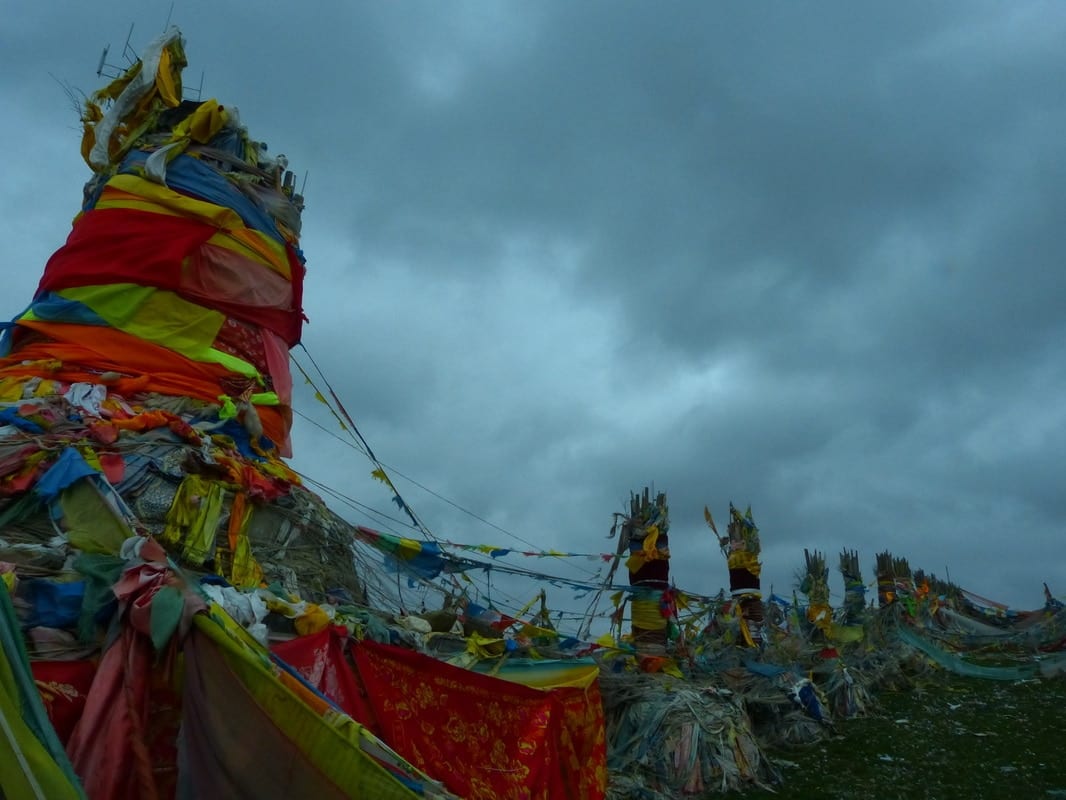
Daniele has a bit of a cold, while I’m completely exhausted—it could be the altitude. The people at the restaurant also had rooms available and tried to sell us one. It’s clear that the manager’s daughter consults her father to decide what price to offer. They settle on 120 yuan. It was too high, so we decided to leave.
The center of the village is very nice, with all the houses having large verandas. We stop to buy boiled eggs, then head to sleep at the foot of the climb we’ll face tomorrow. We also finally spot the rodent of the steppes, even though we’re not exactly on the steppes.
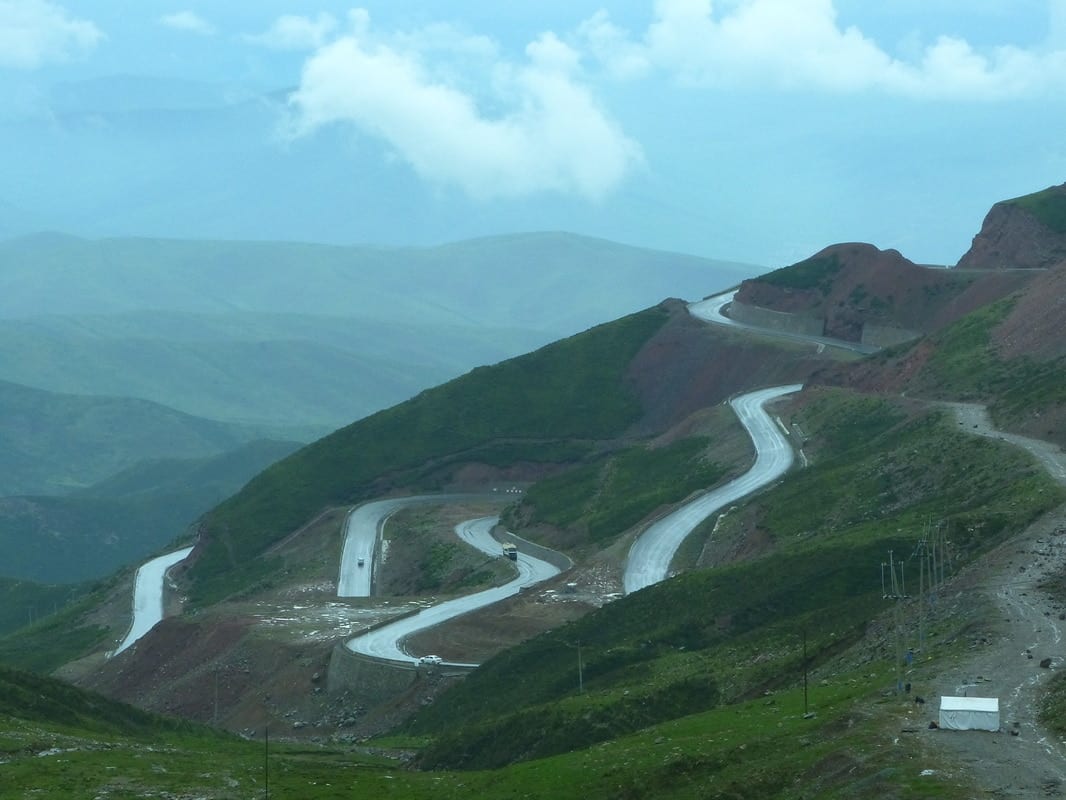
When we wake up, it’s raining. After the first 2 kilometers of a normal ascent, the road makes a 90° bend and becomes steep. We anticipate 12 kilometers of suffering. It takes us five hours. Well, it took me five hours because Daniele reached the pass quite a while before me.
It wasn’t an impossible climb, but after three days of continuous ascent, my legs were obviously weakened, and the steady rain today didn’t help.
About halfway up, there’s a viewpoint where some stands sell a dozen different types of dried yak meat. The man running the stand is very friendly, and Daniele sampled everything while waiting for me for about an hour.
In the final stretch, the road becomes serpentine, a view that’s quite intimidating when seen from below. Daniele rode my bike a little while I climbed on foot. That duffer. Despite being soaked and quite tired, we finally reached the top, and then came the downhill ride—all the way to Xining!
The first 16 kilometers is a steep descent, the kind where you have to keep the brakes constantly pressed if you don’t want to hit 60 kilometers per hour. On this side of the pass, the mountains are even more beautiful, and much greener.
After the steep section, the descent continues but less intensely, like riding a scooter at 20 kilometers per hour. We can enjoy the scenery and the beautiful river flowing alongside us.
Some guys down the road try to sell us something we don’t understand (we found out later it was the miraculous “caterpillar fungus”).
Again, there are several of these “minorities.” Of course, calling them minorities is a bit strange. There are no Han Chinese here—here, they are the minority.
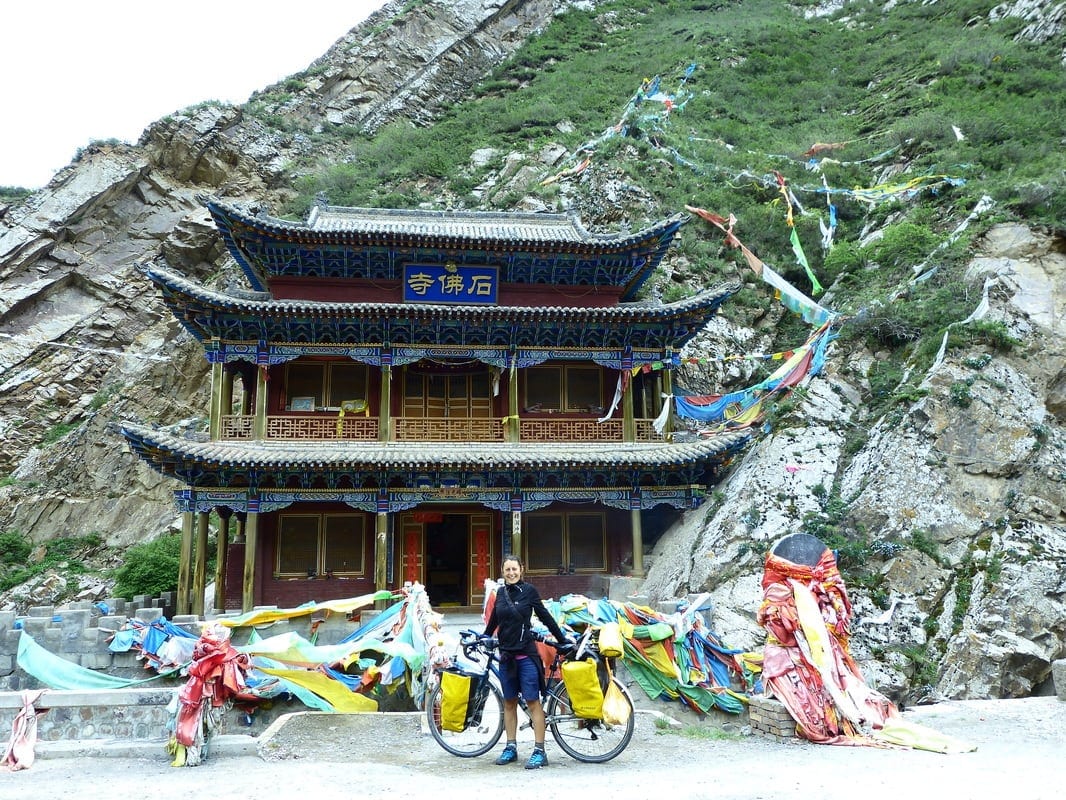
We arrive at a beautiful lake created by a dam, where we meet a guy in a car who insists on accompanying us to Xining. But we really don’t want to—we love this road and want to continue riding. Little did we know that we might regret not accepting his offer.
In the end, we take a picture together and say our goodbyes. A few minutes later, a downpour starts, so we stop and set up our tent under some trees along a riverbank for shelter. The rain stops, and we take the opportunity to wash in the river.
We hang our clothes out, hoping they’ll dry overnight. When we wake up, the sun is just about to rise over the mountain behind us—a sight we haven’t seen in the past week. Some old men come by to curiously observe us, but they don’t stay long.
We get a late start, around 11, but with everything dry, it feels like a small victory. Not long after, I get a puncture—or rather, the tube had split.
The villages along the road are charming, and the surrounding countryside is beautiful. We’re starting to see crops again, no longer just endless corners. We stop to enjoy some good lamian in broth along the way.
It’s a fine day overall, except that on our way into the city of Datong, about 30 kilometers from what was supposed to be our destination, Xining, we run into some unexpected adventures with the Chinese police. More on that in the next post.


